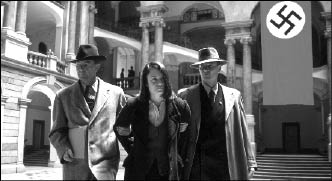Next story: One Thug and a Baby: Tsotsi
Matters of Conscience: Sophie Scholl: The Final Days
by M. Faust

The name “Sophie Scholl” probably meant nothing to a lot of you, as it did to me, when it was read in the title of this German film as one of the five nominees for Best Foreign Language Film at the Oscars last month. The people of Germany, though, know the name well. Sophie Scholl was a university student who, in 1943, was a member of an anti-Nazi resistance movement called the “White Rose.” The group felt that the German public was being deceived about the progress of the war, which they realized was unwinnable. They hoped via pamphlets containing suppressed information about Germany’s losses and defeats, especially those at Stalingrad, to provoke a student uprising that would spread through the country, forcing Hitler’s regime to sue for peace.
Sophie and her brother Hans were captured, perhaps due to their own carelessness, tried for “high treason, troop demoralization and aiding the enemy” and executed. Four of their comrades met the same fate; others were arrested and imprisoned. It’s not hard to see why in Germany, in a country that has spent decades questioning its collective conscience for complicity in the actions of Hitler’s government, Sophie and the others have attained the status of secular saints.
Sophie Scholl: The Final Days is not a history of the war or of the White Rose and its activities. As its title indicates, it begins just before Sophie and Hans’ arrest and ends with their execution. It is based on court transcripts of her interrogation and trial that were discovered in East Germany in 1990, casting new light on the proceedings.
This premise may remind you of both Carl Dreyer and Robert Bresson’s films about Joan of Arc, both also based on court transcripts. Each of these films (I was also reminded of Alain Cavalier’s transcendent Thérèse) is about a young woman who is firm and unyielding in her beliefs. In every way an ordinary girl, Sophie (compellingly portrayed by Julia Jentsch) certainly doesn’t want to die: She takes joy from life, from dancing and music, from her upcoming marriage to a young man who is serving on the Eastern front.
But she is blessed with purity of belief. She has heard of the government’s eugenics programs, of its treatment of Jews and the rumors of extermination camps. And nothing her prosecutor does to shake her beliefs, to shame her, even to get her to feign forgiveness to save her life, moves her. Just the opposite: If she was ever troubled by doubts, she goes to her death secure in the knowledge of a good cause. (Her executioner reported that he never saw a prisoner approach death with so erect a carriage.)
There were times while watching Sophie Scholl when I questioned its purpose. Did the world need another film to tell us how nasty the Nazis were, especially one whose ending was a foregone conclusion? (Even if you’ve never heard of the White Rose, I’ve given away nothing by telling you that it ends with Sophie’s execution: The film’s title does that.) Why not tell the film from the point of view of brother Hans, whose story seems to have more dramatic content—he fought on the Eastern front and saw the slaughters he wants to expose; he is studying to be a doctor.
But in the end this isn’t really a film about World War II. The trappings of the era are minimized, no more swastikas and “Heil Hitler!”s than necessary to maintain the setting. Director Marc Rothemund wanted to address issues and ask questions that will always be relevant to our lives: How aware are we of right and wrong in our lives? What could we, would we do to prevent injustice? Is there anything for which we would lay down our lives? In an era when it’s all too easy to distance ourselves from the evils of the world, seemingly so mundane and unavoidable, these are questions worth asking, even as we hope never to confront them as Sophie does.
|
Issue Navigation> Issue Index > v5n15: Tom Golisano on the Buffalo Creek Casino (4/13/06) > Film Reviews > Matters of Conscience: Sophie Scholl: The Final Days This Week's Issue • Artvoice Daily • Artvoice TV • Events Calendar • Classifieds |









 Current Issue
Current Issue